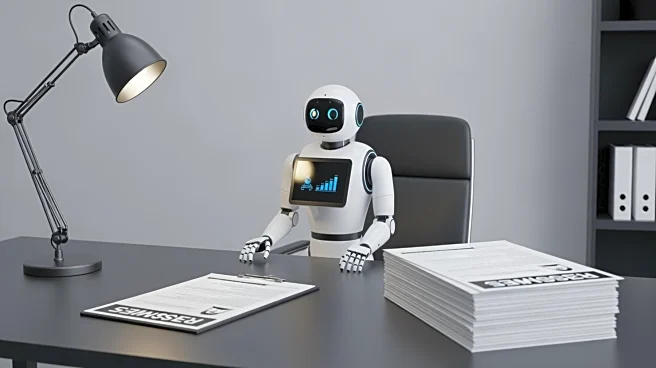What's Happening?
Recruiters are increasingly expected to build future-ready workforces, with artificial intelligence (AI) playing a crucial role in this transformation. However, a recent LinkedIn survey reveals a significant
gap in the strategic use of AI among recruiting teams. While 86% of recruiters report that their CEOs expect them to leverage AI to shape the workforce of the future, only a third consider themselves 'AI power users.' This indicates a lack of strategic integration of AI into their processes. The survey, presented at LinkedIn's Talent Connect conference, also highlights that nearly half of recruiters fear their organizations may fall behind competitors if they do not enhance their AI capabilities. LinkedIn's Chief Operating Officer, Dan Shapero, emphasized the dual pressures of budget constraints and increasing requisition loads, suggesting that AI could help recruiters manage these challenges more effectively.
Why It's Important?
The integration of AI in recruiting is pivotal for maintaining competitive advantage in the rapidly evolving job market. Organizations that fail to strategically implement AI risk falling behind, as AI can significantly enhance efficiency and candidate experience. For recruiters, AI offers the potential to shift from administrative tasks to more strategic roles, allowing them to focus on building deeper relationships with candidates and aligning talent acquisition with long-term business goals. This shift is crucial as companies face increasing demands to do more with less, particularly in the context of budgetary constraints and rising recruitment needs. The successful adoption of AI could lead to improved hiring processes, better candidate matches, and ultimately, a more agile and future-ready workforce.
What's Next?
LinkedIn is expanding its AI tools, such as the Hiring Assistant, which has already shown promising results in improving recruitment efficiency. Future updates will include integration with Microsoft Teams and various applicant tracking systems, enhancing real-time collaboration and comprehensive candidate evaluations. These developments aim to further streamline the recruitment process and encourage more strategic use of AI. As organizations continue to navigate the challenges of AI adoption, there will likely be a focus on training and mindset shifts among recruiters to embrace AI as a tool for strategic advantage. Companies that successfully integrate AI into their recruitment strategies may set new standards for talent acquisition, influencing industry practices and expectations.
Beyond the Headlines
The broader implications of AI in recruiting extend beyond immediate efficiency gains. Ethically, the use of AI raises questions about bias and fairness in hiring processes, necessitating careful consideration and oversight. Culturally, the shift towards AI-driven recruitment may alter traditional roles and expectations within HR departments, requiring a reevaluation of skills and competencies. Long-term, the successful integration of AI could lead to a more dynamic and responsive workforce, better equipped to meet the challenges of a rapidly changing business environment. However, this transformation will require ongoing investment in technology and human capital to ensure that AI is used responsibly and effectively.











